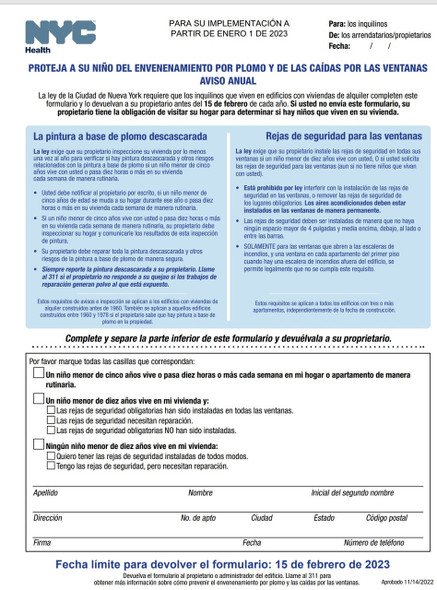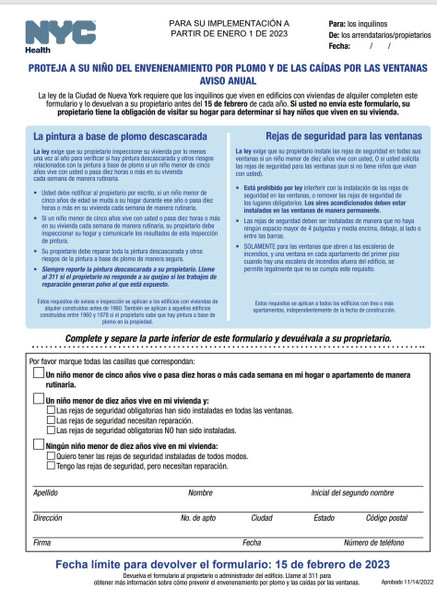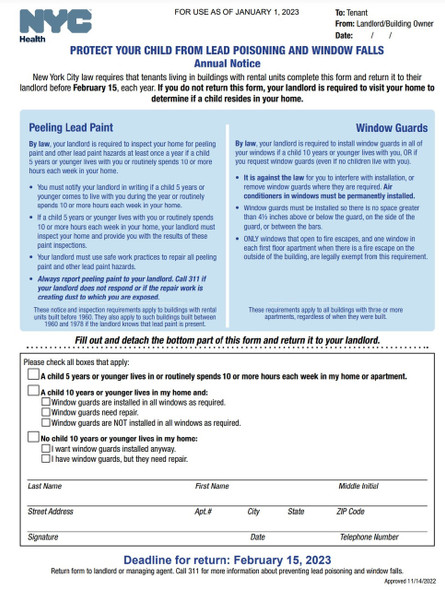hpdsigns.nyc
2025 Windows guard and lead paint notice English/ Spanish (pdf)
- SKU:
- 2025 Windows guard and lead paint notice English/ Spanish (pdf)
- UPC:
- MPN:
- 2025 Windows guard and lead paint
Description
2025 Windows guard and lead paint notice (PDF)
Property owners and landlords in New York City have a legal and ethical obligation to ensure the safety and well-being of their tenants. Two critical areas where compliance is non-negotiable are lead poisoning prevention and window fall protection. Failing to meet these requirements can lead to serious health risks for tenants, legal repercussions for property owners, and significant fines.
Lead Poisoning Prevention: Protecting NYC’s Residents
Why Lead Poisoning is a Concern
Lead is a toxic metal that poses severe health risks, especially to children under the age of 6 and pregnant women. Exposure to lead, often through deteriorating lead-based paint or lead-contaminated dust, can lead to developmental delays, learning difficulties, and even long-term neurological damage.
In NYC, many older buildings constructed before 1960 contain lead-based paint. To combat lead poisoning, the city has enacted strict laws under Local Law 1 of 2004, also known as the Lead-Based Paint Hazard Reduction Act.
Owner Responsibilities for Lead Compliance
As a property owner, you are legally required to:
- Conduct Annual Inspections: Inspect apartments annually for lead-based paint hazards if tenants include children under 6 years old.
- Provide a Lead Disclosure Form: Inform tenants about known lead hazards in the building before leasing a unit.
- Remediate Hazards Safely: Use EPA-certified contractors to safely repair lead-based paint issues.
- Provide the EPA’s Lead Pamphlet: Supply tenants with the “Protect Your Family from Lead in Your Home” pamphlet at the start of their lease.
- File Compliance Documents: Submit an annual compliance certification to the NYC Department of Housing Preservation and Development (HPD).
Penalties for Non-Compliance
Failing to address lead hazards can result in significant fines, legal action, and a tarnished reputation as a property owner. More importantly, neglecting lead safety can cause irreparable harm to tenants' health.
Window Fall Protection: Preventing Tragic Accidents
The Window Guard Law
NYC’s Window Guard Law (Health Code Section 12) mandates that property owners install window guards to prevent window falls, particularly in homes with children under 10 years old. Window falls are a leading cause of preventable injuries and deaths among young children.
Owner Responsibilities for Window Guards
To comply with NYC regulations, property owners must:
- Survey Tenant Needs Annually: Send tenants an annual notice asking if children under 10 live in the apartment. Tenants must respond, and owners are responsible for keeping accurate records.
- Install Approved Window Guards: Ensure all required windows, including those in public areas such as hallways and stairwells, are equipped with NYC-approved window guards.
- Cover Costs: Install window guards at no additional cost to tenants.
- Maintain and Inspect Guards: Regularly check window guards to ensure they are securely in place and repair them promptly when needed.
- Educate Tenants: Inform tenants not to tamper with or remove window guards.
Consequences of Non-Compliance
Owners who fail to comply with window guard requirements can face hefty fines from the NYC Department of Health and Mental Hygiene. Worse, they could be held liable in the event of a preventable accident.
Steps to Stay Compliant and Protect Tenants
- Educate Yourself on Local Laws: Regularly review updates to NYC regulations regarding lead paint and window guards.
- Communicate with Tenants: Be proactive in educating tenants about lead hazards and window safety. Use notices, pamphlets, and clear instructions.
- Partner with Professionals: Work with certified lead abatement contractors and reputable window guard providers to ensure compliance.
- Document Everything: Keep thorough records of inspections, tenant responses, and maintenance work.
- Perform Regular Inspections: Don’t wait for complaints. Regularly inspect your property to ensure lead hazards and window safety measures are addressed.
The Bottom Line
As a property owner in NYC, ensuring compliance with lead poisoning prevention and window fall protection laws is not just about avoiding penalties—it’s about safeguarding the lives and well-being of your tenants. By taking proactive measures, you contribute to a safer city and protect yourself from the legal and financial consequences of non-compliance.
Remember, the cost of prevention is far less than the cost of negligence. Take action today to secure your building and create a safer home for your tenants.
Legal Disclaimer
Business Representation We are a small, family-owned and operated business based in Brooklyn, New York. Please note that we are not affiliated with, sponsored by, or connected to the City of New York or any of its agencies. The website, products, services, and any hyperlinks found on our website are not endorsed by, approved by the City of New York or any of its agencies, including but not limited to the New York City Department of Housing Preservation and Development (HPD), Department of Buildings (DOB), Department of Transportation (DOT), Department of Sanitation (DSNY), and the Fire Department of New York (FDNY). We are also not affiliated with any federal, state, or local government agencies in any way.
Disclaimer of Legal Accuracy and Timeliness The information, codes, and due dates provided on this website or any related documentation may not be the most up-to-date version. Laws, regulations, and requirements may change, and the information here may not reflect the most current version. It is the user’s responsibility to verify the accuracy, completeness, and adequacy of the information contained on this site or any information linked to government sites. We do not guarantee or warrant the accuracy of the information presented, and we encourage you to check with official sources, such as state or federal agencies, for the most current information.
User Responsibility for Compliance Please note that legal requirements can vary based on your location and intended use of the products or services. It is solely the responsibility of the customer or user to ensure that they are in compliance with all applicable state, federal, local, and municipal laws and regulations. We make no warranty or representation regarding the suitability or sufficiency of the information provided on this website, including its use in compliance with any law.
No Legal or Professional Advice The information provided on this website and in any related materials is intended for general informational purposes only. It should not be interpreted as legal advice, professional advice, or a statement of law. For specific legal guidance or advice regarding your situation, we recommend consulting with a qualified attorney or other professional.
For more detailed information, please refer directly to the applicable laws and regulations for your state, city, and municipality.
Related Products


Windows guard and lead paint notice 2023 English/ Spanish (pdf file)
hpdsigns.nyc


Windows guard and lead paint notice 2024 English/ Spanish (pdf file)
FDNY FORM


Windows guard and lead paint notice 2023 English/ Spanish (pdf file)
FDNY FORM


Windows guard and lead paint notice 2024 English/ Spanish (pdf file)
hpdsigns.nyc

SPANISH Lease commencement lead-based paint Notice (pdf file)
hpdsigns.nyc

